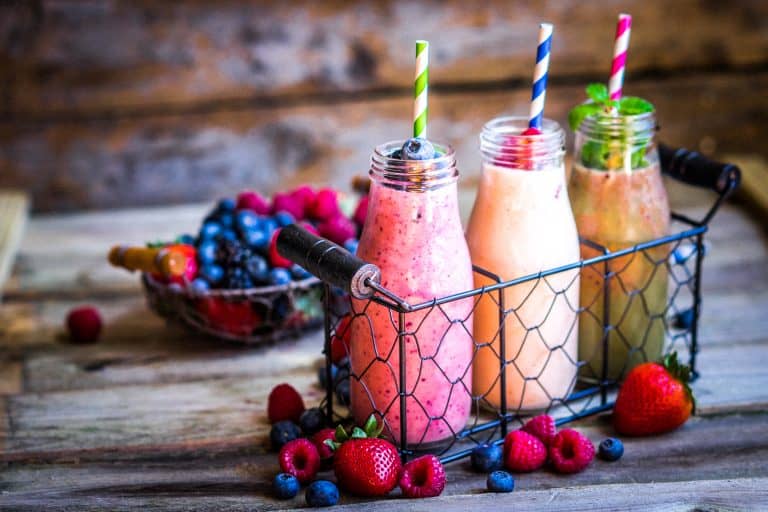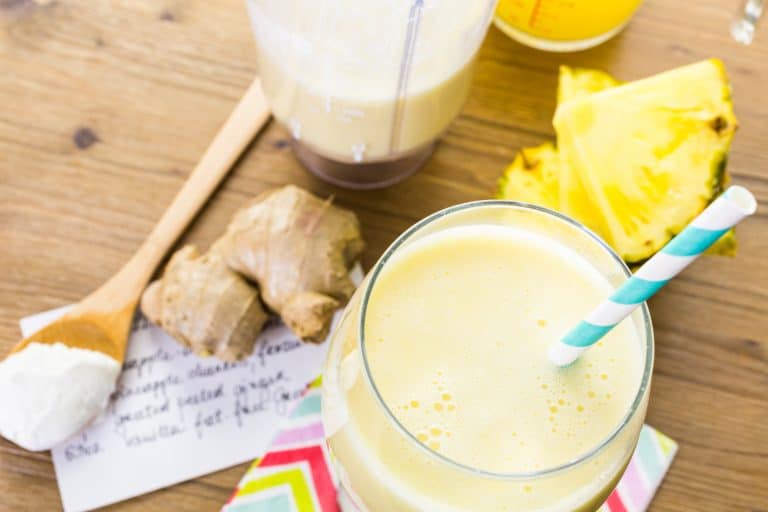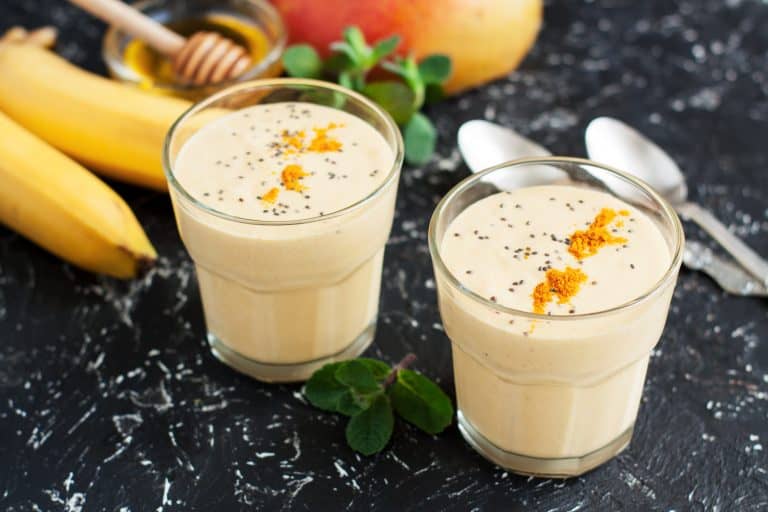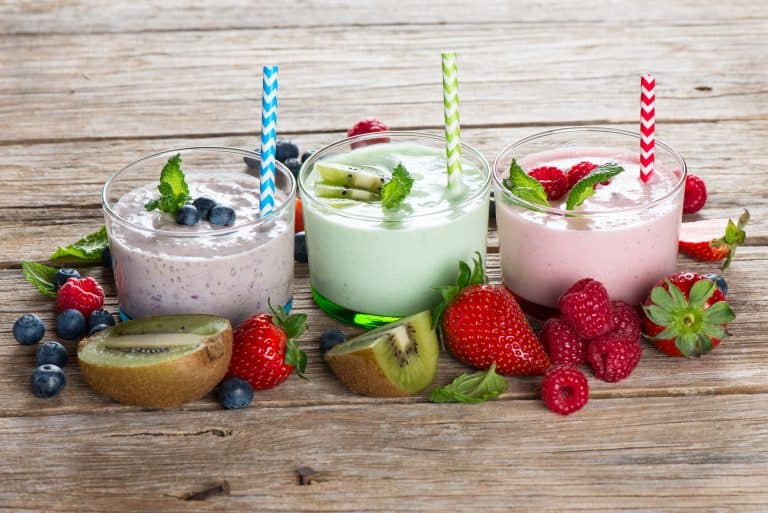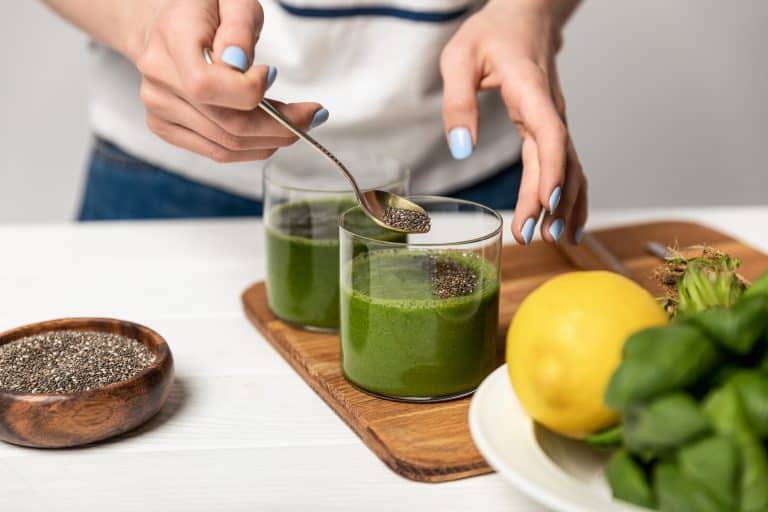How to Use Coconut in Smoothies (Plus Recipe!)
Disclosure: This post may contain affiliate links, meaning I get a commission if you decide to make a purchase through my links, at no cost to you.
Want to know how to use coconut in smoothies? Read on for more!
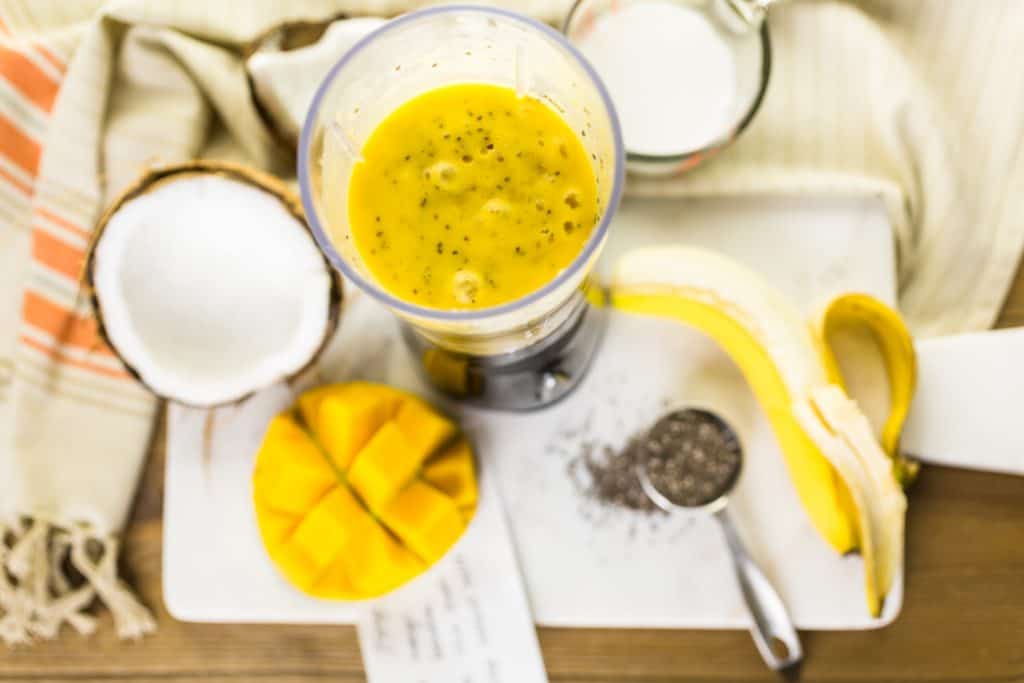
Welcome to our smoothie blog, where we dive deep into the world of vibrant flavors and wholesome nutrition. Today, we’re going to explore a beloved ingredient that adds a tropical twist to our delightful concoctions: coconut.
As a busy mom of four boys, I’ve found that incorporating coconut into our smoothies not only satisfies their taste buds but also provides us with a wealth of health benefits.
With one of my sons being dairy-free due to an allergy, coconut has become a game-changer in our pursuit of nutritious and delicious smoothie recipes. Join me as we unlock the secrets of using coconut in smoothies and create refreshing blends that nourish both body and soul.
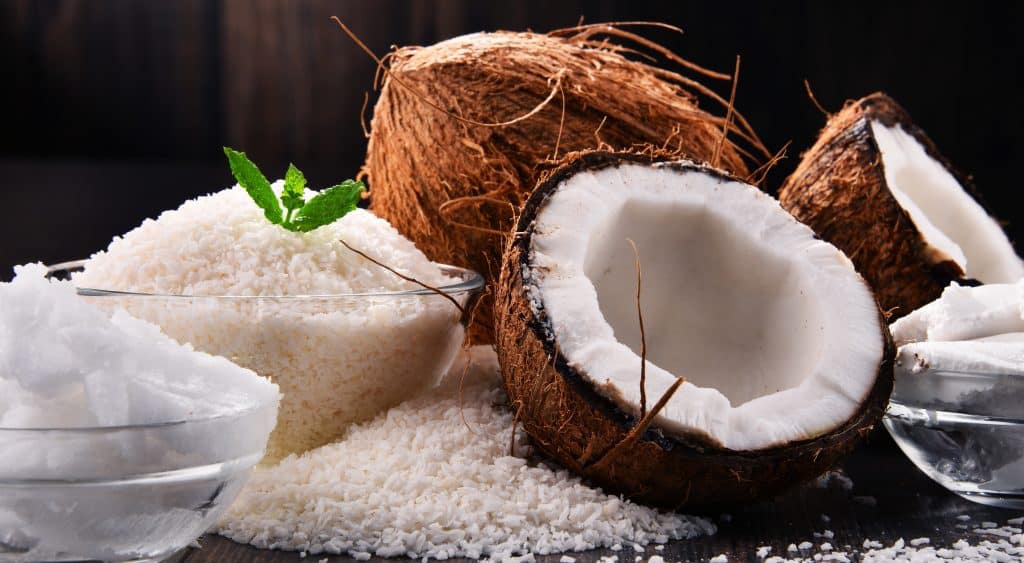
Why Use Coconut in Smoothies?
As you embark on your smoothie journey, it’s essential to understand the reasons why incorporating coconut into your blends can be a game-changer. Let’s explore the numerous benefits that make coconut a superstar ingredient in smoothie recipes.
Nutritional benefits of coconut
Coconut is not only delicious but also packs a nutritional punch. It contains healthy fats and is rich in lauric acid, which is known for its potential antibacterial and antiviral properties.
By adding coconut to your smoothies, you’re introducing a healthy source of fats that can aid in satiety and provide sustained energy throughout the day. Moreover, lauric acid supports immune health and overall well-being, making coconut a fantastic addition to your daily smoothie routine.
Unique flavor and texture of coconut
One of the main reasons we adore using coconut in our smoothies is the distinct tropical flavor it imparts. The natural sweetness and nutty undertones of coconut transport us to sunny beaches with every sip.
Additionally, coconut lends a creamy and indulgent texture to smoothies, making them feel like a treat. This velvety consistency enhances the overall drinking experience and can even replace less healthy options like ice cream or sugary additives.
Versatility of coconut in smoothie recipes
Another remarkable aspect of coconut is its versatility. It comes in various forms, allowing you to customize the coconut flavor intensity to suit your preferences.
Whether you opt for coconut milk, coconut cream, coconut oil, or shredded coconut flakes, each form brings its unique qualities to the smoothie game. From enhancing creaminess to adding visual appeal and depth of flavor, coconut can take your smoothie creations to new heights of taste and satisfaction.
Now that we’ve uncovered the whys behind using coconut in smoothies, let’s explore the different forms of coconut that can elevate your blends to a whole new level of deliciousness.
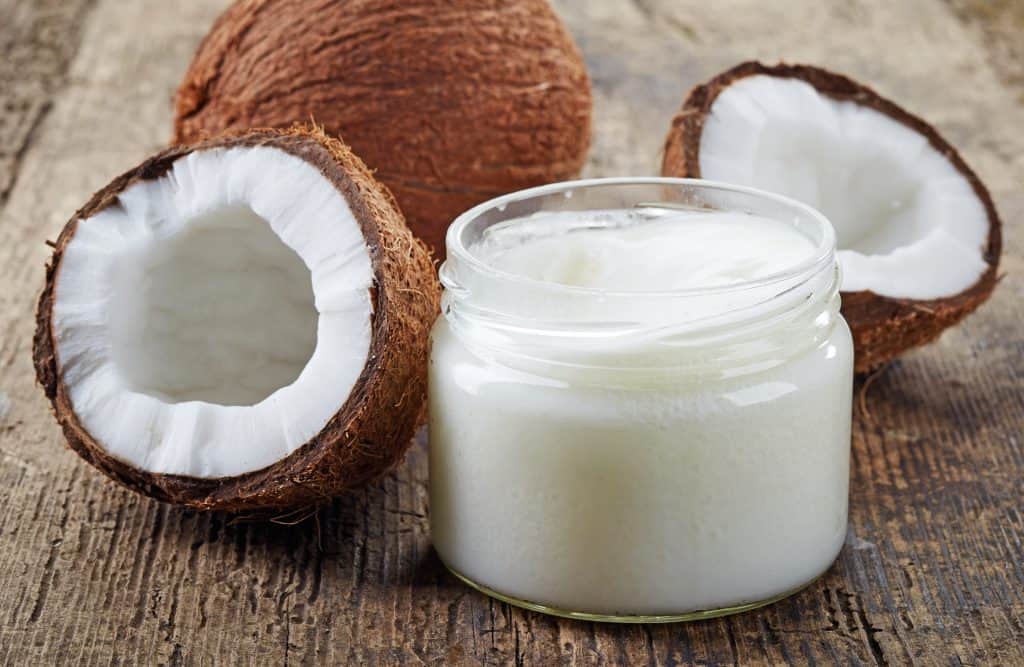
Types of Coconut Products and Their Uses
Coconut is a versatile ingredient that can be used in a variety of forms to add a tropical flavor to your smoothies. Each form of coconut brings its own unique taste and texture, making it a wonderful addition to any smoothie recipe.
Coconut Milk
Coconut milk is a creamy, rich liquid made from the meat of mature coconuts. It’s a fantastic alternative to regular milk or almond milk in smoothies, adding a delicious coconut flavor and a smooth texture. Coconut milk smoothies are a favorite in my household, and they’re a great way to incorporate healthy fats into your diet.
Coconut Oil
Coconut oil is a form of saturated fat that is extracted from coconut meat. It’s a wonderful ingredient to add to your smoothies, especially if you’re looking for a boost of energy. The lauric acid in coconut oil is known for its health benefits, including boosting the immune system and improving heart health.
Coconut Water
Coconut water is a hydrating, nutrient-rich liquid found in the center of young, green coconuts. It’s a fantastic addition to any smoothie recipe, providing a subtle coconut flavor and plenty of electrolytes. I often use coconut water in my smoothies as a healthier alternative to sugary fruit juices.
Coconut Cream
Coconut cream is thicker and richer than coconut milk. It’s made from simmering four parts shredded coconut in one part water. The cream that rises to the top of a can of coconut milk is also considered coconut cream. It adds a rich, creamy texture to smoothies, making them feel more like a decadent treat.
Shredded Coconut
Shredded coconut is simply the meat of the coconut that has been grated or shredded. It’s a wonderful addition to smoothies, adding a bit of texture and a burst of coconut flavor. I love topping my smoothies with a sprinkle of shredded coconut for an extra tropical touch.
Coconut Flakes
Coconut flakes are larger pieces of dried, unsweetened coconut. They’re a great way to add some crunch to your smoothies and can also be used as a garnish on top. My boys love the extra crunch that coconut flakes add to their smoothies!
Canned Coconut Milk
Canned coconut milk is similar to the coconut milk you can make at home, but it’s often thicker and creamier. It’s a convenient option for smoothies and can be used in place of fresh coconut milk.
Unsweetened Coconut Milk
Unsweetened coconut milk is a great option if you’re watching your sugar intake. It has all the creaminess and coconut flavor of regular coconut milk, but without any added sugars.
Coconut Yogurt
Coconut yogurt is a dairy-free alternative to regular yogurt, made by fermenting coconut milk with live cultures. It adds a tangy flavor and probiotics to your smoothies, promoting gut health. This is great for my son who is allergic to dairy.
Coconut Meat
Coconut meat is the white, firm part of the coconut that you find when you crack open a fresh coconut. It’s high in fiber and healthy fats, and adds a nice chewy texture to your smoothies.
Each of these coconut products can be used in various ways in your smoothie recipes, so don’t be afraid to experiment and find your favorite combinations!
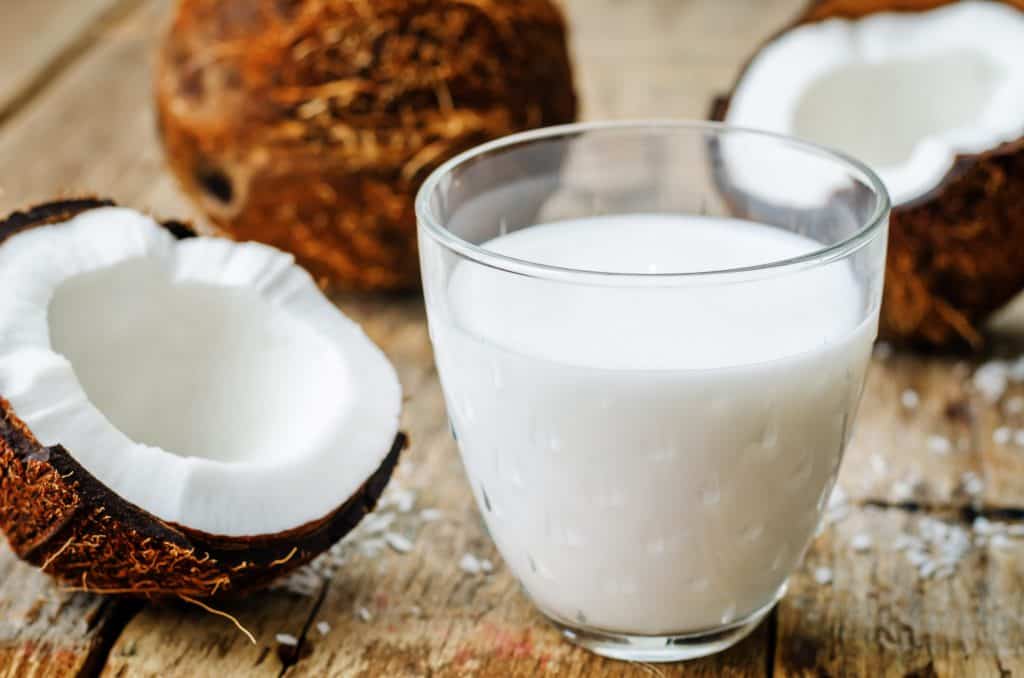
Benefits of Using Coconut in Smoothies
As a mom who’s always looking for ways to keep my family healthy and happy, I’ve found that incorporating coconut into our smoothies has been a game-changer. Not only does it add a delicious tropical flavor that my boys can’t get enough of, but it also comes with a host of health benefits.
Nutritional Powerhouse
Coconut is a nutritional powerhouse, packed with essential vitamins and minerals. It’s a great source of manganese, which is essential for bone health and the metabolism of carbohydrates, proteins, and cholesterol. Plus, it’s rich in copper and iron, which help form red blood cells.
Healthy Fats
Coconut is high in medium-chain triglycerides (MCTs), a type of fat that your body can easily absorb and use for energy. These healthy fats can help you feel full and satisfied, making your smoothies more filling. This has been a key factor in my own weight loss journey.
Lauric Acid
One of the main fatty acids in coconut oil and coconut milk is lauric acid. Lauric acid is known for its antimicrobial properties, meaning it can help your body fight off harmful bacteria and viruses. It’s a great way to boost your immune system, which is always a plus with four boys in the house!
Hydration
If you’re using coconut water in your smoothies, you’re in for a hydration boost. Coconut water is rich in electrolytes, making it a natural way to replenish your body’s fluids after a workout or a hot day outside.
Fiber
Coconut meat and shredded coconut are high in dietary fiber. Fiber is essential for a healthy digestive system and can help to keep you feeling full longer. This is especially helpful if you’re trying to lose weight or if you’re just trying to keep those hungry boys satisfied until dinner!
Versatility
One of the things I love most about using coconut in our smoothies is its versatility. Whether you’re using coconut milk, coconut water, coconut oil, or shredded coconut, there are so many ways to incorporate this nutritious ingredient into your recipes.
Incorporating coconut into your smoothies is a delicious and nutritious way to start the day. Whether you’re on a weight loss journey like me, or just trying to keep your family healthy, coconut is a fantastic ingredient to add to your smoothie repertoire.
Favorite Coconut Smoothie Recipes
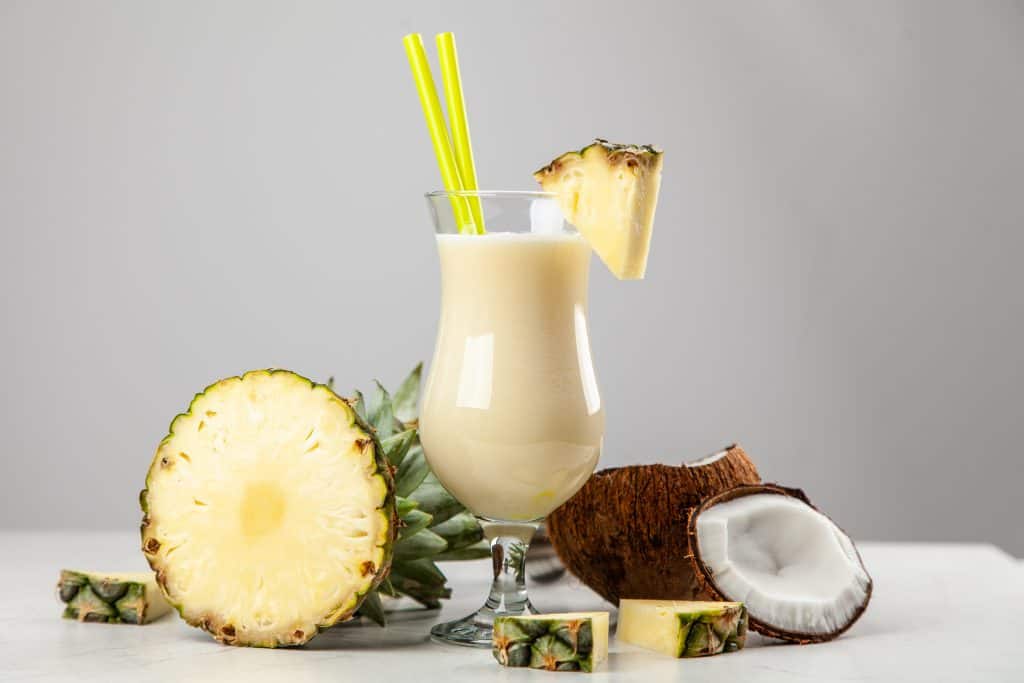
Coconut Pineapple Smoothie – enjoy the taste of pina colada in a healthy way! These flavor combinations are some of my absolute favorites, and this one is a big hit in our house.
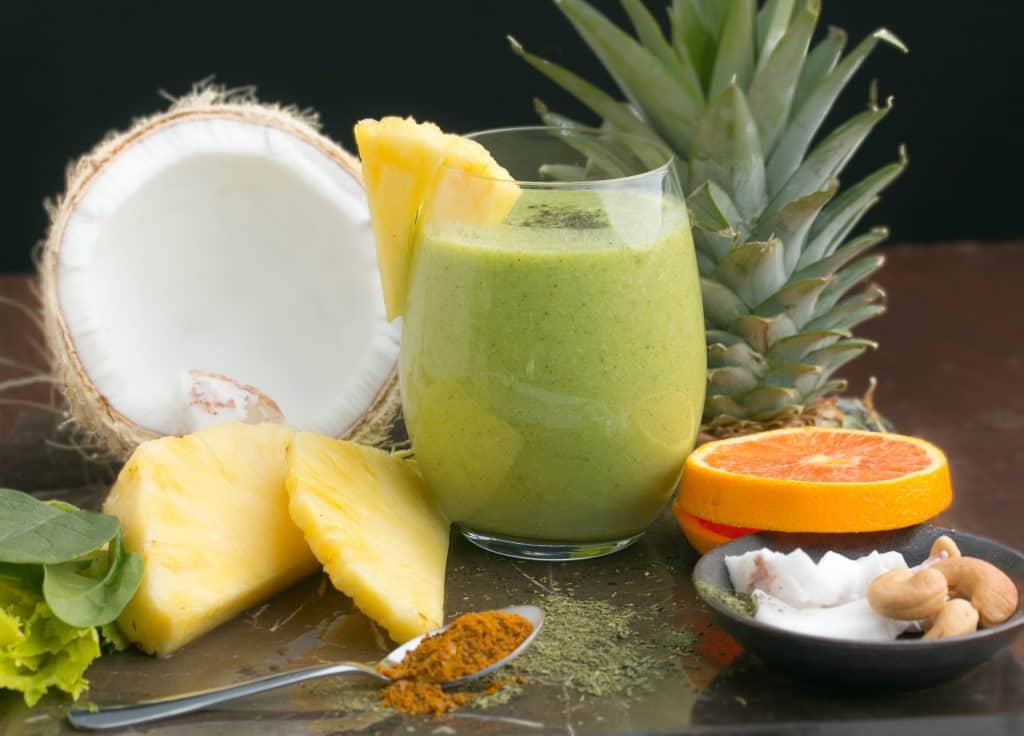
Coconut Water Smoothie – we really love coconut water in our house, and the boys request it regularly. We incorporated it into this smoothie recipe and it’s a winner!
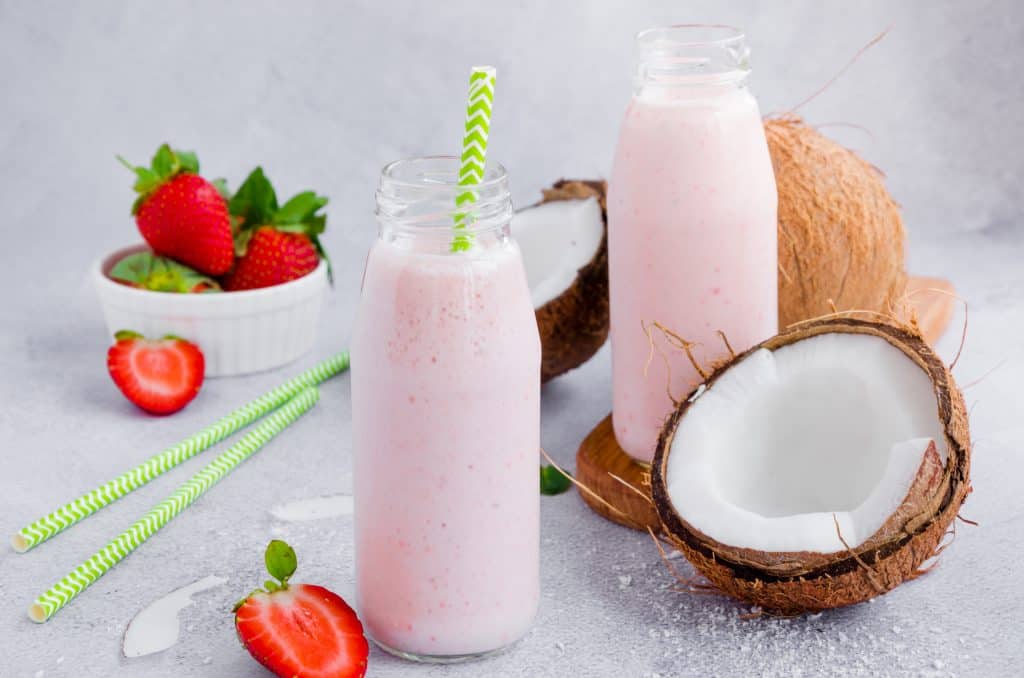
Strawberry Coconut Fat Bomb Smoothie – for those on a low carb diet, which I do off an on, this smoothie is delicious.
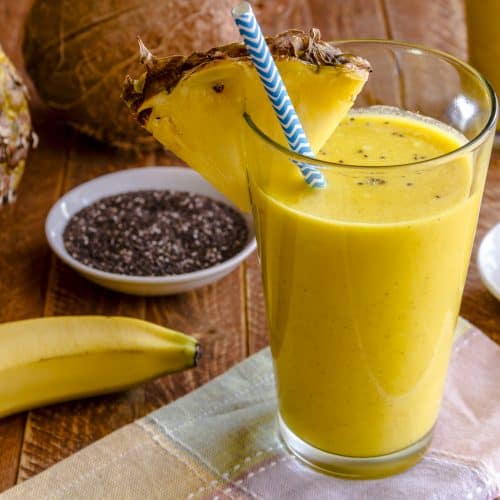
Coconut Oil Smoothie
Equipment
- 1 blender high speed is best
Ingredients
- 1 medium banana fresh or frozen
- 1/2 cup pineapple fresh, frozen or canned
- 1/2 cup mango fresh or frozen
- 1 Tbsp coconut oil or MCT oil
- 1/4 cup spinach fresh or frozen
- 1/4 tsp turmeric
- 1 Tbsp chia seeds
- 1 cup coconut milk or coconut water
Instructions
- Place all ingredients except liquid in blender.
- Pour liquid of choice over ingredients.
- Blend until smooth.
- Garnish with toppings of your choice.
Additional Ingredients for Coconut Smoothies
Creating the perfect coconut smoothie is all about finding the right balance of flavors and textures. While coconut is the star of the show, there are plenty of other ingredients that can enhance its tropical flavor and boost the nutritional value of your smoothie. Here are some of my family’s favorite additions:
Fruits
Fruits are a smoothie staple in our household. They add natural sweetness, vibrant color, and a host of essential vitamins and minerals. Here are some fruits that pair particularly well with coconut:
Pineapple: This tropical fruit adds a tangy sweetness to your smoothies and pairs perfectly with coconut. Fresh pineapple is always a treat, but frozen pineapple works just as well and gives your smoothie a refreshing, icy texture.
Banana: Bananas add a creamy texture to your smoothies and a subtle sweetness. They’re also a great source of potassium. I often use frozen bananas in my smoothies to make them extra thick and creamy.
Mango: Mango adds a sweet, tropical flavor to your smoothies. Like bananas, frozen mango can help thicken your smoothie and make it more filling.
Strawberries: Strawberries add a tart, refreshing flavor to your smoothies. They’re also packed with vitamin C. Try a strawberry banana smoothie with a splash of coconut milk for a delicious breakfast or snack.
Sweeteners
While fruits add a natural sweetness to your smoothies, sometimes you might want a little extra. Here are some healthier options:
Maple Syrup: This natural sweetener adds a warm, slightly caramel-like flavor to your smoothies. Plus, it’s a great source of antioxidants.
Agave Syrup: Agave syrup is a sweetener derived from the agave plant. It’s sweeter than sugar, so you can use less of it. It also dissolves easily in cold liquids, making it perfect for smoothies.
Protein and Healthy Fats
Adding protein and healthy fats to your smoothies can help keep you full and satisfied. Here are some of my go-to options:
Greek Yogurt: Greek yogurt adds a creamy texture and a good dose of protein to your smoothies. If you’re dairy-free, try coconut yogurt instead!
Almond Butter: Almond butter adds a nutty flavor and a boost of protein and healthy fats. It pairs wonderfully with coconut and banana in a smoothie.
Chia Seeds: Chia seeds are a great way to add fiber, protein, and omega-3 fatty acids to your smoothies. They have a neutral flavor, so they won’t interfere with the taste of your smoothie.
Extras
For an extra boost of flavor, try adding a splash of coffee to your coconut smoothie. It adds a rich depth of flavor and a little caffeine kick. My boys might not be coffee drinkers yet, but this mom certainly appreciates the extra boost in the morning!
Remember, the best smoothies are the ones that you enjoy the most, so don’t be afraid to experiment with different ingredients and find your perfect blend. Happy blending!

Tips for Making the Perfect Coconut Smoothie
Creating the perfect coconut smoothie is an art, and like any art, it requires a bit of practice and a lot of love. Here are some tips I’ve picked up along the way that can help you make the most of your coconut smoothie creations:
Choose Your Coconut Product Wisely
The type of coconut product you use can greatly affect the taste and texture of your smoothie. For a lighter, more refreshing smoothie, opt for coconut water. If you’re after a rich, creamy smoothie, coconut milk or coconut cream is your best bet. For a boost of fiber, try adding some shredded coconut or coconut meat.
Balance Your Flavors
Coconut has a distinct, tropical flavor that pairs well with a variety of fruits. Try combining it with pineapple for a piña colada-inspired smoothie, or mix it with banana and almond butter for a creamy, satisfying treat. Don’t be afraid to experiment with different flavor combinations to find your favorite.
Consider Your Sweetness Level
While coconut and fruit can provide natural sweetness, you might find you want a little extra. Maple syrup and agave syrup are great natural sweeteners that can enhance the flavors of your smoothie without adding refined sugar. Remember, a little goes a long way!
Don’t Forget the Ice
If you’re using fresh fruit in your smoothie, don’t forget to add a handful of ice to make it nice and cold. If you’re using frozen fruit, you can skip the ice.
Blend Well
To get a smooth, creamy texture, make sure to blend your smoothie well. I recommend starting on a low speed to break up the larger pieces, then gradually increasing the speed until your smoothie is perfectly smooth.
Common Questions on Using Coconut in Smoothies
Yes, coconut smoothies are good for you. Coconut is a nutritional powerhouse, providing essential vitamins and minerals, healthy fats, and fiber. When combined with other nutritious ingredients like fruits and Greek yogurt, a coconut smoothie can be a balanced, healthy meal or snack.
Both coconut water and coconut milk can be great for smoothies, depending on your preference. Coconut water is lighter and more refreshing, making it perfect for a hydrating, post-workout smoothie. Coconut milk is richer and creamier, ideal for a filling breakfast or dessert-like smoothie.
Coconut water is a great choice for smoothies because it’s hydrating and packed with electrolytes. It’s a lighter option than coconut milk, making it perfect for those who prefer a less creamy smoothie. Plus, it adds a subtle coconut flavor without overpowering the other ingredients.
Both coconut milk and almond milk can be used in smoothies. Coconut milk provides a rich, creamy texture and a tropical flavor, while almond milk is lighter and has a subtle nutty flavor. The choice depends on your personal taste and nutritional needs.
Final Thoughts on How to Use Coconut in Smoothies
Coconut is a versatile, nutritious ingredient that can take your smoothies to the next level. Whether you’re using coconut milk, coconut water, coconut oil, or shredded coconut, there are countless ways to incorporate this tropical fruit into your smoothie recipes.
Not only does coconut add a delicious flavor to your smoothies, but it also provides a host of health benefits, from hydration to a boost of healthy fats. Plus, it pairs beautifully with a variety of fruits and other ingredients, allowing you to get creative with your recipes.
As a mom on a mission to provide nutritious, delicious meals for my family, I’ve found coconut to be an invaluable ingredient in our smoothie routine. I hope these tips and insights inspire you to experiment with coconut in your own smoothie creations.
Happy blending!
Amanda
